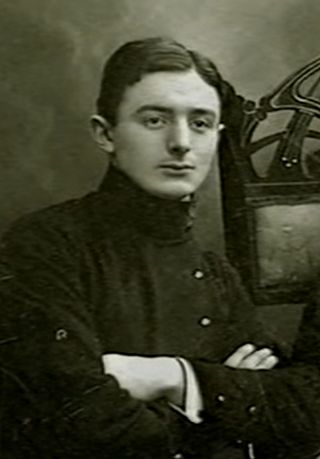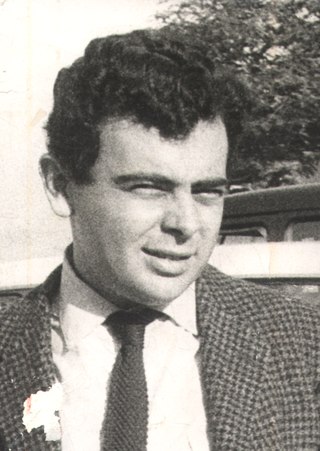
Cahiers du Cinéma is a French film magazine co-founded in 1951 by André Bazin, Jacques Doniol-Valcroze, and Joseph-Marie Lo Duca. It developed from the earlier magazine Revue du Cinéma involving members of two Paris film clubs—Objectif 49 and Ciné-Club du Quartier Latin.

A documentary film or documentary is a non-fictional motion picture intended to "document reality, primarily for instruction, education or maintaining a historical record". Bill Nichols has characterized the documentary in terms of "a filmmaking practice, a cinematic tradition, and mode of audience reception [that remains] a practice without clear boundaries".

Dziga Vertov was a Soviet pioneer documentary film and newsreel director, as well as a cinema theorist. His filming practices and theories influenced the cinéma vérité style of documentary movie-making and the Dziga Vertov Group, a radical film-making cooperative which was active from 1968 to 1972. He was a member of the Kinoks collective, with Elizaveta Svilova and Mikhail Kaufman.

Jean-Luc Godard was a Franco-Swiss film director, screenwriter, and film critic. He rose to prominence as a pioneer of the French New Wave film movement of the 1960s, alongside such filmmakers as François Truffaut, Agnès Varda, Éric Rohmer and Jacques Demy. He was arguably the most influential French filmmaker of the post-war era. According to AllMovie, his work "revolutionized the motion picture form" through its experimentation with narrative, continuity, sound, and camerawork. His most acclaimed films include Breathless (1960), Vivre sa vie (1962), Contempt (1963), Band of Outsiders (1964), Alphaville (1965), Pierrot le Fou (1965), Masculin Féminin (1966), Weekend (1967) and Goodbye to Language (2014).

Man with a Movie Camera is an experimental 1929 Soviet silent documentary film, directed by Dziga Vertov, filmed by his brother Mikhail Kaufman, and edited by Vertov's wife Yelizaveta Svilova. Kaufman also appears as the eponymous Man of the film.

Jean Rouch was a French filmmaker and anthropologist.

Glauber de Andrade Rocha was a Brazilian film director, actor and screenwriter. He was one of the most influential moviemakers of Brazilian cinema and a key figure of Cinema Novo. His films Black God, White Devil and Entranced Earth are often considered to be two of the greatest achievements in Brazilian cinematic history, being selected by Abraccine as, respectively, the second and fifth best Brazilian films of all-time. Rocha also the distinction of having the most films on Abraccine's list: 5 films.
Jean-Pierre Gorin is a French filmmaker and professor, best known for his work with Nouvelle Vague luminary Jean-Luc Godard, during what is often referred to as Godard's "radical" period.

La Chinoise, ou plutôt à la Chinoise: un film en train de se faire, commonly referred to simply as La Chinoise, is a 1967 French political docufiction film directed by Jean-Luc Godard about a group of young Maoist activists in Paris.
Letter to Jane is a 1972 French postscript film to Tout Va Bien directed by Jean-Luc Godard and Jean-Pierre Gorin and made under the auspices of the Dziga Vertov Group. Narrated in a back-and-forth style by both Godard and Gorin, the film serves as a 52-minute cinematic essay that deconstructs a single news photograph of Jane Fonda in Vietnam. This was Godard and Gorin's final collaboration.
The Dziga Vertov Group was formed around 1969 by politically active filmmakers including Jean-Luc Godard and Jean-Pierre Gorin. Their films are defined primarily for Brechtian forms, Marxist ideology, and a lack of personal authorship.
Peter Wollen was a film theorist and filmmaker. He studied English at Christ Church, Oxford. Both political journalist and film theorist, Wollen's Signs and Meaning in the Cinema (1969) helped to transform the discipline of film studies by incorporating the methodology of structuralism and semiotics. He taught film at a number of universities and was Professor Emeritus at the University of California, Los Angeles at the time of his retirement from academe in 2005.

Jean-Luc Godard was a French-Swiss film director, screenwriter and film editor whose career spanned nearly seventy years. He directed, wrote, produced and edited many films. The following attempts to be a comprehensive filmography.

Soviet montage theory is an approach to understanding and creating cinema that relies heavily upon editing. It is the principal contribution of Soviet film theorists to global cinema, and brought formalism to bear on filmmaking.
Here and Elsewhere is a 1976 documentary film by Jean-Luc Godard and Anne-Marie Miéville. It is a film essay, narrated by Godard and Miéville, on the limitations and artificiality of cinema in attempting to portray reality. It is additionally a critique of the Dziga Vertov Group, the partnership of Godard and Jean-Pierre Gorin who together made a number of political, pro-Marxist films between 1968 and 1972.
European art cinema is a branch of cinema that was popular in the latter half of the 20th century. It is based on a rejection of the tenets and techniques of classical Hollywood cinema.
British Sounds is an hour-long avant-garde documentary film shot in February 1969 for television, written and directed by Jean-Luc Godard and Jean-Henri Roger, and produced by Irving Teitelbaum and Kenith Trodd. It was produced during Godard's most outspokenly political period. London Weekend Television refused to screen it owing to its controversial content, but it was subsequently released in cinemas. Godard credited the film as being made by 'Comrades of the Dziga-Vertov group'.
The Austrian Film Museum is a film archive and museum located in Vienna, Austria. It was founded by Peter Konlechner and Peter Kubelka in 1964 as a non-profit organization.

Enthusiasm: The Symphony of Donbas, also referred to as Donbas Symphony or The Symphony of the Donbas Basin, is a 1931 sound film directed by Soviet filmmaker Dziga Vertov. The film was the director's first sound film and also the first of the Soviet production company Ukrainfilm. The film's score is considered experimental and avant-garde because of its incorporation of factory, industrial, and other machine sounds; human speech plays only a small role in the film's sounds.

Kino-Eye is a film technique developed in Soviet Union by Dziga Vertov. It was also the name of the movement and group that was defined by this technique. Kino-Eye was Vertov's means of capturing what he believed to be "inaccessible to the human eye"; that is, Kino-Eye films would not attempt to imitate how the human eye saw things. Rather, by assembling film fragments and editing them together in a form of montage, Kino-Eye hoped to activate a new type of perception by creating "a new filmic, i.e., media shaped, reality and a message or an illusion of a message - a semantic field." Distinct from narrative entertainment cinema forms or otherwise "acted" films, Kino-Eye sought to capture "life unawares" and edit it together in such a way that it would form a new, previously unseen truth.











